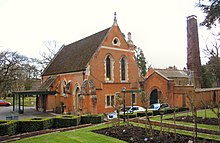astro.wikisort.org - Researcher
George Tomline (3 March 1813 – 25 August 1889), referred to as Colonel Tomline, was an English politician who served as Member of Parliament (MP) for various constituencies. He was the son of William Edward Tomline and grandson of George Pretyman Tomline.
Life
Tomline was baptised on 1 June 1813 at St. Margaret's, Westminster by his grandfather the Bishop of Lincoln.[1]
He was educated at Eton College, following which he made a Grand Tour in Europe mostly travelling in a gig.[2]
He succeeded to his father's estates, at Riby Grove, Lincolnshire, and Orwell Park, Suffolk, in 1836, and he also inherited through his mother, Frances (nee Amler or Ambler), Ford Hall near Shrewsbury, Shropshire.[3] He was Colonel of the Royal North Lincolnshire Militia.[4]
He was Member of Parliament for:[5]
- Sudbury (1840–1841 - as Conservative);
- Shrewsbury (1841–1847 - as Conservative, alongside Benjamin Disraeli) and (1852–1868 - as Liberal);
- Great Grimsby (1868–1874, as Liberal).
In parliament he was well known as an advocate of bi-metallism in currency and for posting silver bars to successive Chancellors of the Exchequer, demanding the Royal Mint had a duty to convert them into coinage.[2][4]
In 1881 he unsuccessfully contested a by-election in North Lincolnshire as a Liberal.
He was High Sheriff of Lincolnshire for 1852.[6]
He was a keen amateur astronomer who built an observatory at Orwell Park.[7][8][9] He was founder and chairman of the Felixstowe Railway and Pier Company which built the Felixstowe Branch Line and established the Port of Felixstowe.[10] Tomline Road in Ipswich which runs parallel to the railway line is named after him.

He died, unmarried, from a stroke after a long illness at his London home, Number 1 Carlton House Terrace on 25 August 1889, aged 76.[11] After a funeral service at St Martin's in the Fields on 29 August, his body was cremated at Woking Crematorium and his ashes sent to London.[2]
His heir, to whom his estates devolved, was the Rt Hon. Captain Ernest George Pretyman MP, at various times Parliamentary Under-Secretary to the Board of Trade, and Civil Lord of the Admiralty.[12]
Tomline Prize
In 1836, Eton College appointed its first Mathematical Master, Mr Stephen Hawtrey, and Tomline promoted the study of this subject by donating money for the mathematics prize: the first recipient was Matthew Piers Watt Boulton in 1837.[13] The long-standing informal arrangement was formalized in 1854 by a deed in which a sum somewhat in excess of £1000 was granted for the purposes of a scholarship. The prize was open to the whole school and the winner (known as the Tomline Prizeman) received £30 worth of books.[14][15]
Several winners of the Tomline Prize were notable in a mathematical field, including Norman Macleod Ferrers (1846), Philip Herbert Cowell (1886), G.H.J. Hurst (1887 - 2nd Wrangler and Fellow of King's), John Maynard Keynes (1901), J. B. S. Haldane (1909), T.H.R. Skyrme (1939), Peter Swinnerton-Dyer (1943), Robin Milner (1952), Luke Hodgkin (1956 - Mathematics, King's College London), John Pryce (1957 - Emeritus Professor of Mathematics, Cardiff) and Warren Li (2016 - Senior Wrangler in 2019). The prize has been awarded annually as the principal mathematics prize at Eton since 1837 (with a hiatus between 1977 and 1987); since 2010, candidates for the prize must write an extended mathematical essay and are called on to defend it viva voce.
References
- "George Tomline baptism record".
- "The late Col. Tomline". Eddowes's Shrewsbury Journal. 4 September 1889. p. 5.
- Not to be confused with Fordhall in same county but near Market Drayton.
- Transactions of the Shropshire Archaeological Society, Series 4, Volume XII (1929-30). Article Shrewsbury Members of Parliament by Henry T. Weyman.
- Gooding (2003)
- "No. 21287". The London Gazette. 3 February 1852. p. 289.
- Goward (2006)
- Whiting, Paul J. (2006). "The Work of John Isaac Plummer at Orwell Park Observatory in the Years 1874 to 1890". The Antiquarian Astronomer. Society for the History of Astronomy. 3: 95–100. Bibcode:2006AntAs...3...95W. Retrieved 5 November 2015.
- "Colonel Tomline's Observatory". Monthly Notices of the Royal Astronomical Society. Royal Astronomical Society. 50 (4): 211–212. 1890. Bibcode:1890MNRAS..50R.211.. doi:10.1093/mnras/50.4.183. Retrieved 5 November 2015.
- "History of the Port". Retrieved 4 May 2009.
- "The late Col. Tomline. An Interesting Reminiscence". Eddowes's Shrewsbury Journal. 28 August 1889. p. 5.
- Allen 2005, 98.
- Cust, Lionel (1899). A History of Eton College. London: Duckworth & Co. p. 178-179.
- "Eton Collections Online". etoncollege.com. Retrieved 3 July 2021.
- "OASI: Tomline". oasi.org.uk. Retrieved 9 April 2017.
Bibliography
- Allen, David, 'Victorian Suffolk's Great Eccentric: Colonel George Tomline 1813-1889', Proceedings of the Suffolk Institute of Archaeology and History 41, Part 1 (2005), 79-102.
- Bence-Jones, G. (1995). Orwell Park. Electric Ink Ltd.
- Burke, Sir Bernard (1863). A Genealogical and Heraldic Dictionary of the Landed Gentry of Great Britain and Ireland. London: Harrison. pp. p.1518. Retrieved 22 August 2007.
william edward tomline.
- Gooding, R. (2003). "George Tomline & Relatives". Orwell Astronomical Society. Archived from the original on 2 August 2005. Retrieved 22 August 2007.
- Goward, K. J. (2006). "Founding of Orwell Park Observatory". Orwell Astronomical Society. Archived from the original on 30 June 2007. Retrieved 22 August 2007.
- Gowing, R. Shave (1875) "George Tomline", in Public Men of Ipswich and East Suffolk Ipswich:Scopes and London:Grant & Co, 103–109.
Obituaries
- Eddowes's Shrewsbury Journal, 28 August 1889
- Lincolnshire Chronicle, 30 August 1889
- Ipswich Journal, 30 August 1889
- Shrewsbury Chronicle, 30 August 1889
External links
- Hansard 1803–2005: contributions in Parliament by George Tomline
Другой контент может иметь иную лицензию. Перед использованием материалов сайта WikiSort.org внимательно изучите правила лицензирования конкретных элементов наполнения сайта.
WikiSort.org - проект по пересортировке и дополнению контента Википедии